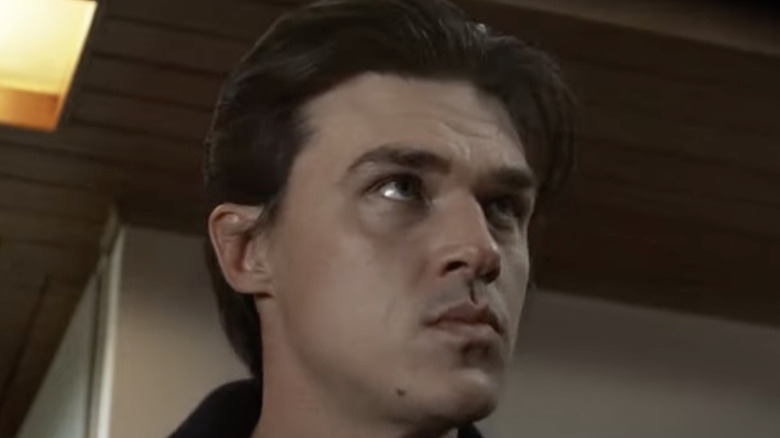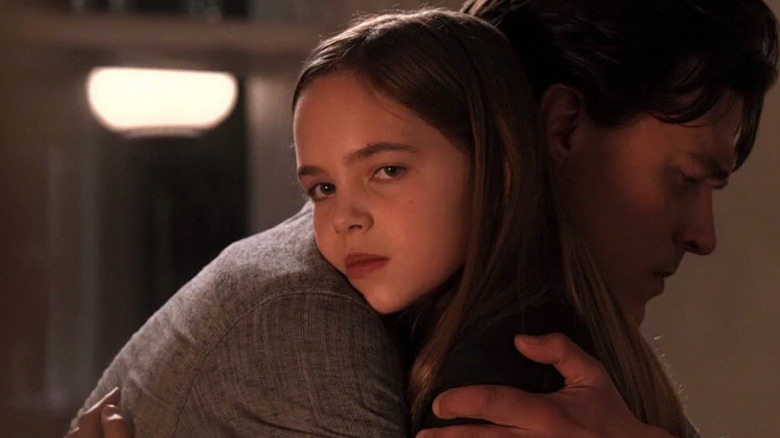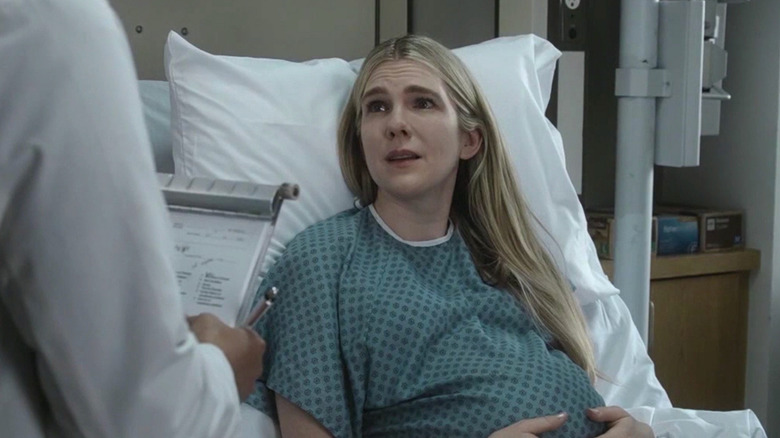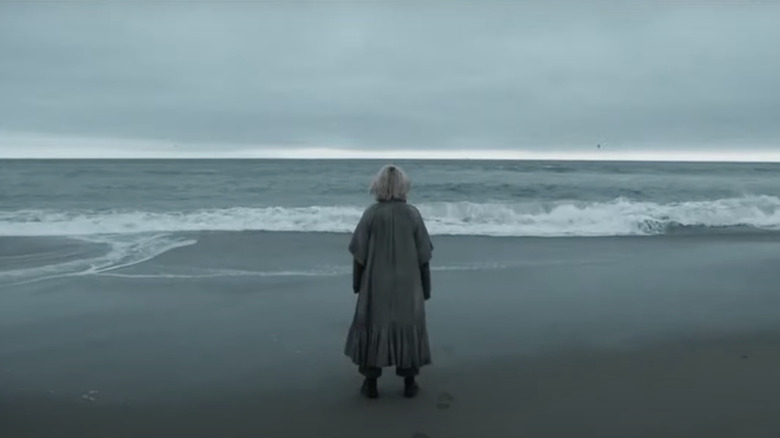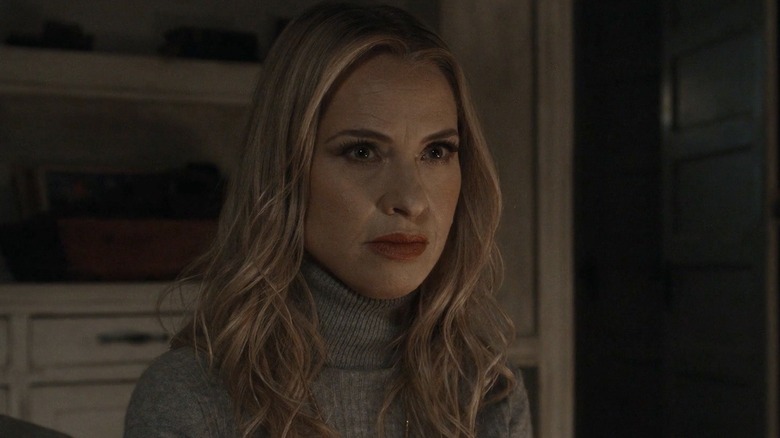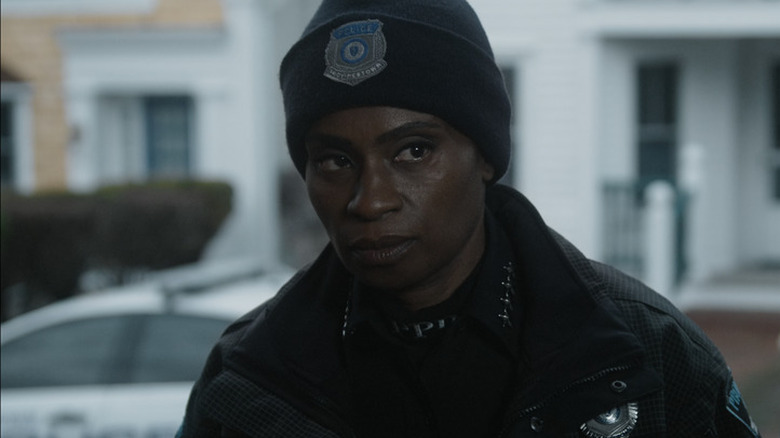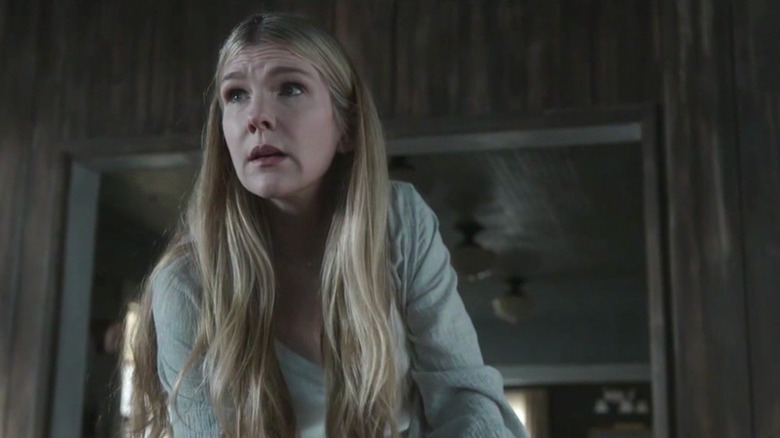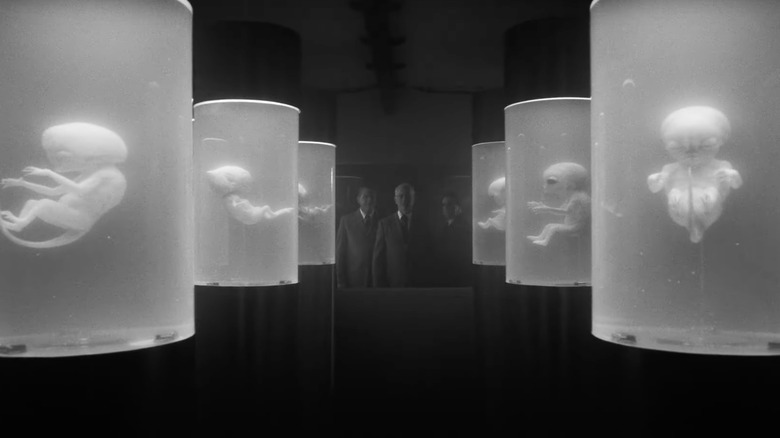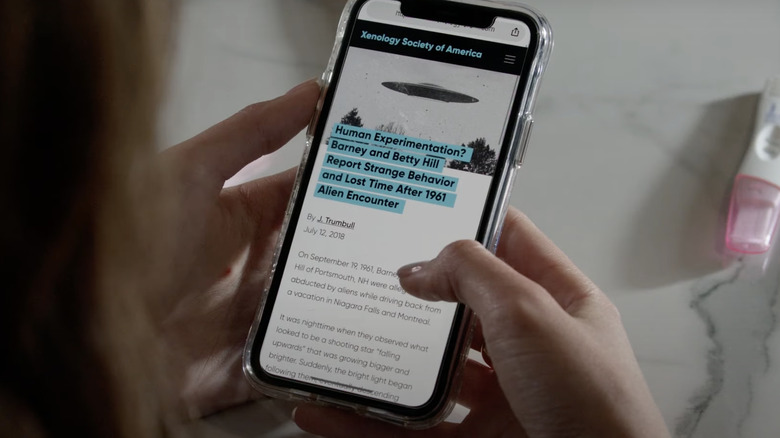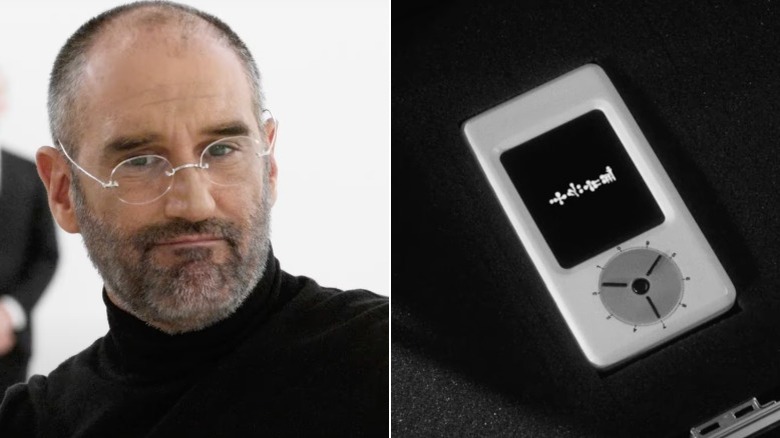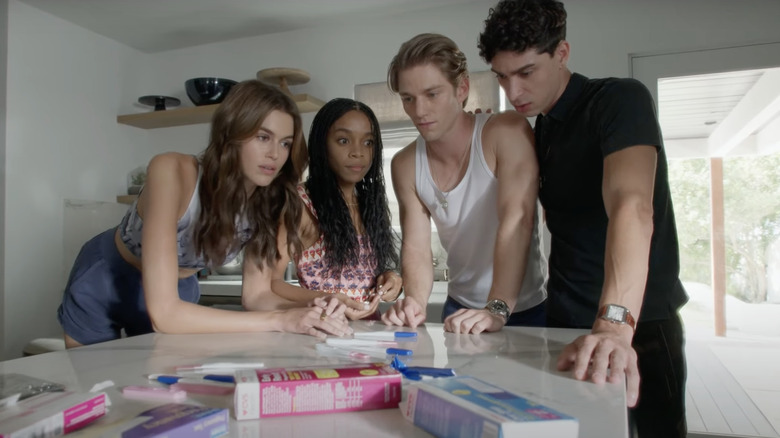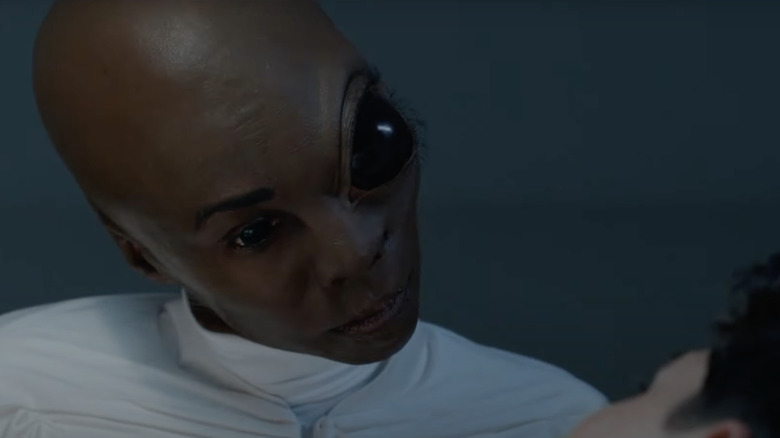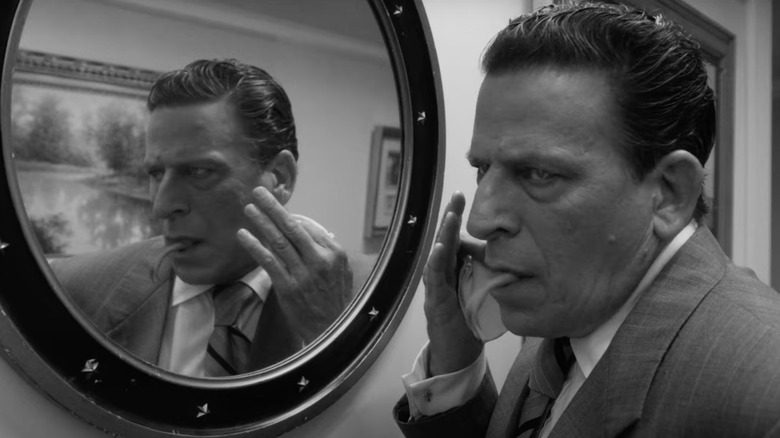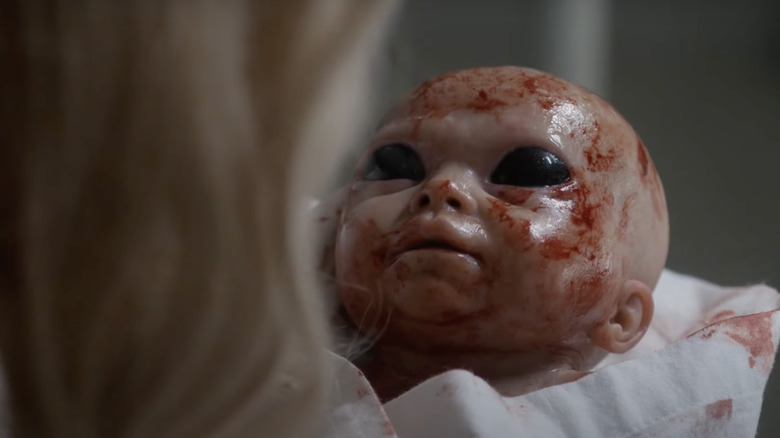Biggest Unanswered Questions From American Horror Story: Double Feature
Viewers were taken on a journey of political and social commentary through Ryan Murphy's twisted imagination in the tenth installment of his horror anthology series "American Horror Story: Double Feature." Given that this season was a major milestone for the franchise, the creators decided to redefine the horror genre by splitting the season in half, with two separate stories: one set by the water, and one by the desert.
The first story, "Red Tide," was a poignant interpretation of the pressures of being talented, the pattern of the rich using the less fortunate to get richer, and the opioid epidemic. The story revolves around a struggling writer named Harry Gardner (Finn Wittrock), who refers to himself as a "crap screenwriter." Harry picks up his family and moves to Provincetown, Massachusetts for a few months. Frequently referred to as P-town, this is a place that many have come to know as a sanctuary for creatives and artists who would spend time there and return with brilliant works of art; a quiet, beach town used to clear one's thoughts and gain inspiration. After an encounter with a Tony-winning playwright and a famous romance novelist (played by Evan Peters and Frances Conroy respectively), Harry is given a black pill that will supposedly release the creative subconscious and unlock an artist's full potential. The only catch? You become a blood-sucking monster and run the risk of becoming a "pale person" if you are not truly talented.
Conversely, the second story of the season is titled "Death Valley" and delves into the answers behind our nation's greatest conspiracy theories. Splitting the story into multiple time periods, this sci-fi thriller focuses heavily on Dwight "Ike" Eisenhower (Neal McDonough) and the government's involvement in alien abductions and the establishment of Area 51. This "Twilight-Zone"-esque story attempts to explain some of the biggest questions in American history, including: the moon landing, John F. Kennedy's assassination, Watergate, Marilyn Monroe's death, 9/11, the Iraq War, and the list goes on.
Both "Red Tide" and "Death Valley" intertwine fiction with historically accurate events. The former reminded "AHS" audiences of how great the series could be and contains some of the most beautiful writing and conceptualization in the entire franchise. The latter, however, was underwhelming in comparison, biting off more than it could chew. Following the finale, many "AHS" fans were left scratching their heads, filled with countless unanswered questions. While Ryan Murphy and Brad Falchuk are not necessarily revered for their finale episodes, Season 10 took it a step further. Here is a list of our biggest unanswered questions from "American Horror Story: Double Feature."
What happened to Alma?
Audiences love to hate Ryan Kiera Armstrong's brilliant portrayal of Alma Gardner, a character so evil that some consider her to be one of the biggest villains of the "AHS" universe. Her extreme hatred for mediocrity has led to her becoming an overachieving child musician unequipped to handle failure and refusing to associate with people who don't possess talent.
Following the murder of her father, Alma moved to Los Angeles with Ursula, Eli, and The Chemist. Alma auditioned for the Los Angeles Philharmonic as a young prodigy, but soon got knocked off her pedestal by another young musician, informing her that she isn't that special. This of course results in Alma eating him alive ...in broad daylight. Many questions still remain: Did Alma receive the first chair position in the Philharmonic? And beyond that, was she able to get away with such a flagrant act of violence? Alma had grown addicted to the black pills at the ripe age of eleven, going to extreme lengths for them. Considering this, how will Alma continue her successful music career without the one thing that made it possible for her to succeed?
What happened to Eli?
To say that Eli Gardner's days as a newborn were chaotic would be an understatement. In the penultimate episode of "Red Tide", appropriately titled "Gaslight", it becomes clear that the Gardner baby would not be safe with this family for long. Within moments of cutting the umbilical cord, Harry rushes his wife's blood-soaked linens to the hospital bathroom, wringing them out into cups in the most routine way, as if they were sweaty gym towels. One of the most shocking moments of the season came in the days following the birth, as Doris awoke to find Alma sucking blood from her newborn brother's leg, causing her to faint at the sight.
As Doris (Lily Rabe) is recovering from childbirth, Alma and Ursula devise a plan to manipulate her into taking the black pill, knowing she would become a pale person from her lack of natural talent; as Alma says to her dad, "People like her just want to get through the day." This plan proves to be effective, as pale-faced Doris is shunned from her family in one of the most staggering betrayals in "AHS" history.
Soon after this, Harry is also out of the picture and Eli has suddenly lost the only people willing and capable to keep him safe. After spending time in Los Angeles, pushing black pills on aspiring screenwriters and dirty cops (quite literally burning LA to the ground in the process), The Chemist is seen snatching Eli and the pills, driving off into the sunset in search of a new place to experiment in. So, where did Eli and The Chemist go? Did Eli grow up to be talented like his family, and will he be a significant character moving forward in "AHS?"
What was Karen's masterpiece?
In one of the most heartbreakingly beautiful scenes in all of "American Horror Story," we witness the final moments of Karen and Mickey, stunningly played by Sarah Paulson and Macaulay Culkin. Known by the locals as "Tuberculosis Karen," she is portrayed as the crazy lady in town, but the irony is that she is the sanest of them all. Although Karen has shown natural artistic talent, she refuses to take the black pill, even after all these years.
A she explained to Mickey, "...I don't care if I'm good enough...I don't want to be like you. You're not human." Unfortunately, when her best friend and only true confidant turns on her, she is forced to take the black pill, and realizes that there is no possibility for redeeming Mickey's soul. They go to the beach, where Karen finds the perfect spot to paint her masterpiece, her "Last Supper" or "Starry Night," as Mickey refers to it. Much to his surprise, however, Karen takes her first and only life that day as she sinks her teeth into Mickey's neck.
After Karen paints her masterpiece, she expresses a sense of relief as she slits her wrists and walks into the ocean to die, never to see what could have come from her unlocked potential. This acts as a social commentary on society's treatment of addicts and impoverished communities, as well as the logic that one life has more value than another. For their own selfish reasons, the talented people of P-town continuously take advantage of the people that "won't be remembered," much like the rich using the poor to get richer. Many fans were surprised to receive no mention of Karen's story in the final episode of "Red Tide." What was Karen's masterpiece? Was it ever found and shared with the world? Will her legacy live on, or will she be forgotten? Everybody can agree: we need #JusticeForKaren.
Did Ursula ever get caught?
Depicted by Leslie Grossman, the character of Ursula is more heartless and evil than most of the people that take the black pill. Acting as Harry's literary agent, it is soon learned that Ursula is extremely intuitive and discovers the operations going on in P-town all on her own.
Once back in Los Angeles, Ursula begins blatantly pushing the black pills on anyone she can. Being that she hands out pills like they're candy to screenwriting classes and "anyone on a laptop with a script on it," it comes as no surprise that anarchy soon erupts in the streets of Hollywood, setting up the joke that not a single one of those people were naturally talented. Unfortunately, Ursula's story is never fully wrapped up. Did she ever get caught? It seems impossible for Ursula to deliberately cause what looks awfully similar to a zombie apocalypse, then walk away completely unscathed. Additionally, what will happen to Ursula's agency now that she has lost her supply of black pills?
How has the secret of Provincetown stayed hidden for so long?
The people of Provincetown seem to be fully aware of the bloodthirsty pale people who live among them, yet they choose to keep it hidden from the public. We were introduced to locals like Holden Vaughn (Dennis O'Hare) that were expected to have a greater significance to the central storyline, but ultimately just acted as advocates for The Chemist. According to the Provincetown tourism website, it is "a favorite LGBTQ+ destination ... known for celebrating individuality and freedom of expression." They describe P-town as having a "rich creative history" with one of the oldest continuous art colonies in the country, as well as the birthplace of modern American Theater.
The real-world Provincetown is known to have housed artists and intellectuals such as John Waters, Norman Rockwell, Anthony Bourdain, Jackson Pollock, Kurt Vonnegut, and "AHS" creator Ryan Murphy himself. Given that this is a renowned haven for the world's greatest creatives, how has the word not gotten out about the happenings in P-town? How have the dozens of unexplained human and animal mutilations, and even the murder of their own police Chief Burleson (Adina Porter) not turned any heads? In the final episode, "Winter Kills," State Trooper Jan Remy (Dot-Marie Jones) shows up to P-town to give the residents a stern warning that an investigation will be launched concerning Chief Burleson, but nothing ever comes of it.
Why Lyme disease?
Throughout the first part of the series, Doris repeatedly expresses concern about contracting Lyme disease, a bacteria-caused illness that is transmitted "by the bite of an infected tick." While Lyme disease is certainly unpleasant, in the grand scheme of "American Horror Story" there are far worse things to be worried about; according to the CDC website, "Most cases of Lyme disease can be treated successfully with a few weeks of antibiotics."
Although it was pretty clear to audiences from the beginning that the story of Doris was not going to have a happy ending, her fixation feels like the equivalent of someone in "AHS" being freaked out by a runny nose. In fact, the fixation on this blood-related illness led fans to theorize that Doris would become infected by Lyme disease, possibly leading to her blood becoming toxic to the pale people. Unfortunately, this reference is never paid off, so we are left with the lingering question: Why mention Lyme disease at all?
How does Area 51 operate?
To kick off Part 2 of the season, the largest overarching question from many viewers revolve around the mysteries surrounding Area 51. Located north of Las Vegas, Area 51 has long been rumored to be a military outpost used for confidential government operations. Now more of a tourist attraction, it was once so secretive that the government completely denied its existence until 2013, nearly 60 years after its inception. Pop culture has come to revere Area 51 as the home base for extraterrestrial life, and it continues to be used as a narrative device in numerous TV shows and movies, even if it is now supposedly a training site for the U.S. Air Force.
As it pertains to the Ryan Murphy cinematic universe, President Eisenhower established this location in order for the aliens to conduct their human experimentation without any interference. Not much more about Area 51 is explained to the viewer, however, apart from the alien maternity ward and a film set used for the moon landing. One thing that is made clear is that when someone (or something) is in this facility, aging completely stops. This is perhaps best displayed in Lily Rabe's portrayal of Amelia Earhart, as well as Leslie Grossman's Calico. But it is never explained how the aliens possess this power of immortality, or how the time moves so abnormally in Area 51.
How does this season connect to American Horror Story: Asylum?
Ryan Murphy has made a habit out of spinning a twisted web of connections between all the seasons of "American Horror Story," one element fans of the series really enjoy as they look for clues and Easter eggs.
In the present day, amidst the twentysomething college students' abduction and impregnation, there is a brief Easter egg that seems to connect this story to that from Season 2 of the horror series. "American Horror Story: Asylum" featured similar alien abductions, lost time, and pregnancy among its plot elements. But since this wasn't the central theme of the season, the alien abductions were never explored further in "Asylum," causing many fans to hope for further explanation in Season 10, given that Alma shares a name with one of its lead characters. Sadly, this desire remained largely unfulfilled; the connection wasn't explored, and now seems unlikely to be mentioned again.
Why is Steve Jobs in Area 51?
Apple founder Steve Jobs is glimpsed and mentioned several times throughout the duration of "Death Valley," but we never find out why. The primary reason that the government agreed to participate in the creation of a human-alien hybrid was in order for them to receive extremely advanced technology, to prevent being surpassed by the Soviet Union. In Episode 9, titled "Blue Moon," Valiant Thor, the liaison between the humans and aliens, introduces Ike and Nixon to brand new technology that looks disturbingly similar to an iPod. It is described as a "computing device you can hold in the palm of your hand, more powerful than the IBM 7090", which at the time was taking up an entire room at the Pentagon. Are we supposed to surmise that Steve Jobs is in Area 51 to help the aliens invent new tech? Is Steve Jobs himself an alien? Unfortunately, his significance to the overall story is vague at best.
Why was so much time spent on the college students?
Kaia Gerber made her acting debut in Ryan Murphy's spin-off series "American Horror Stories." Her performance was met with undesirable reviews, however. She was set to return to the anthology series along with fellow "AHS" newcomers Nico Greetham, Isaac Cole Powell, and Rachel Hilson, as home-town pals that reunite for summer vacation. Fans had high hopes for the model to redeem herself following the news of her return for "Double Feature," but sadly, audiences collectively disliked each of the young adults' characters and did not find their stories or personalities compelling enough to form an attachment to them.
The character of Kendall is established as a Luddite, declaring herself to be "cured of the curse of technology." This seems to be Kendall's only defining personality trait, aside from her affair with her Harvard professor — yet, it is abandoned within the first 30 minutes of the episode. This frustrated fans, who deemed it absurd that someone aspiring to be a doctor would be so opposed to technology.
Additionally, fellow childhood friends Troy, Cal, and Jamie needlessly dig into their own personal, frequently quite graphic, sex lives. In the final moments of the series and each of their pregnancies, Troy and Cal become obsessed with the idea of having a family; given that Troy's hobbies include cocaine and Cal's include being pretentious, how is the audience supposed to believe that these two suddenly want a child? Along with Giarda's seminal plasma hypersensitivity angle, the bulk of the time spent in the present is never tied back to the central story — so why bother?
How did Theta survive?
In Episode 8, the audience is introduced to Theta (Angelica Ross), a half human, half alien being responsible for delivering the hybrid newborns. She possesses unique powers that make it possible for her to communicate with people telepathically, and can take away someone's pain. The character is bizarre, stoic, and ultimately raises more questions than answers.
Some fans were left confused about her inclusion in the story, given that the entire premise of the season is the pursuit of the perfect hybrid. Theta is required to kill the infants almost immediately if they show any signs of abnormality. So then, how is Theta alive? Although she shows irregularities to the ideal hybrid, she was still spared and able to live a long enough life to help with the experiment. Why would all of the other hybrids need to be eradicated immediately, but she was able to skirt by?
Why include the lizard people?
Just ... why? In a huge misfire from the writers, the final episode of "Death Valley" sees an introduction to an entirely new species: reptilian people. It is implied that Henry Kissinger, the controversial former U.S. Secretary of State under the Nixon administration, was one of these creatures. Despite being referenced a few times during the finale, there seems to be no real reason behind the inclusion of them to the story, other than tying in as many conspiracy theories as humanly possible. The audience never sees them in their true form and nothing additional comes of this. So, why include them at all?
In a piece published by Time, they describe a similar theory told in the book "The Biggest Secret" by BBC sports reporter David Icke. The book alleges that the reptilian elite are among us, taking the form of people such as Queen Elizabeth, George W. Bush, the Clintons, Bob Hope, and of course Kissinger. It has been theorized that these lizard people are responsible for groups like the Illuminati.
Perhaps Ryan Murphy assumes every viewer has "The Biggest Secret" on their nightstand. But audiences were otherwise left frustrated by this rushed ending and vague mention of lizard people, resulting in a slapdash finale.
What happens next?
Following an abrupt ending that left many fans unsatisfied, numerous questions remain: did the aliens and lizard people eradicate the human race? What does this mean for the larger "AHS" universe? Will beloved "AHS" rookies like Maccauly Culkin return to the series?
For an anthology series that has been around for ten years and over a hundred episodes, "Double Feature" seemed to simultaneously show audiences that fresh ideas were still to be had, and that there is could be some stumbling blocks in additional seasons. On the one hand, it could be called a "mixed bag," but that would seem to be selling Part 1 short. Instead, fans seem likely to agree that "Horror Story" needs more of a "Red Tide" mindset, and less of a "Death Valley" one.
The series still pulls in solid ratings, and its 2020 renewal was for three seasons, which means Seasons 11, 12 and 13 are on the way. While predicting the future of this unpredictable series feels like a fool's errand, one thing is certain: it will be interesting.
